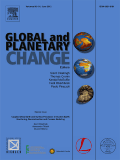
GLOBAL AND PLANETARY CHANGE
Scope & Guideline
Unraveling the Complexities of Planetary Change
Introduction
Aims and Scopes
- Paleoclimatology and Geological History:
Research on past climate changes and geological events, utilizing proxies such as isotopic records, sediment analysis, and fossil studies to understand Earth's climatic evolution. - Climate Change Impacts and Adaptation:
Studies focusing on the effects of climate change on ecosystems, hydrology, and human societies, including assessments of vulnerability and adaptation strategies. - Biogeochemical Cycles and Ecosystem Dynamics:
Exploration of the interactions between biological processes and geochemical cycles, including studies on carbon, nitrogen, and sulfur cycles and their implications for climate and environmental health. - Hydrological and Oceanographic Processes:
Investigating the dynamics of water systems, including riverine, lake, and ocean processes, and their responses to climatic variations and anthropogenic influences. - Environmental Modeling and Simulation:
Development and application of models to simulate environmental processes and predict future changes in climate, hydrology, and ecosystems. - Human-Environment Interactions:
Research examining the impacts of human activities on natural systems, including land use changes, pollution, and resource management.
Trending and Emerging
- Climate Change and Biodiversity Interactions:
Research addressing how climate change affects biodiversity, including species distribution shifts, ecosystem resilience, and conservation strategies, is gaining prominence. - Extreme Weather Events and Impacts:
Studies focusing on the increasing frequency and intensity of extreme weather events, such as floods, droughts, and heatwaves, are becoming more common, reflecting a growing concern over climate variability. - Anthropogenic Influences on Natural Systems:
There is a rising trend in examining how human activities, such as land use changes and pollution, are impacting natural systems, emphasizing the need for sustainable practices. - Integrated Climate-Hydrology Modeling:
Research involving comprehensive models that integrate climate and hydrological processes to better understand water availability and management under changing climatic conditions is on the rise. - Paleoenvironmental Reconstructions:
Emerging techniques and methodologies for reconstructing past environments, particularly through multi-proxy approaches, are increasingly featured, enhancing our understanding of historical climate dynamics.
Declining or Waning
- Volcanism and Climate Interactions:
Though historically significant, research specifically linking volcanic activity to climate changes has become less prominent, possibly due to a broader focus on anthropogenic climate drivers. - Geomorphological Studies:
While geomorphology remains relevant, the emphasis on detailed geomorphological studies has declined as the journal increasingly prioritizes global and systemic environmental change analyses. - Ocean Acidification Studies:
Research specifically focused on ocean acidification, while still important, has seen reduced publication frequency, likely overshadowed by broader climate change narratives. - Paleoecology of Non-Marine Environments:
There has been a noted decrease in studies focusing solely on non-marine paleoecological systems, with a shift toward integrated approaches that encompass marine and terrestrial interactions. - Regional Climate Studies:
While regional studies are still relevant, there is a trend toward more global-scale assessments, leading to a decline in publications focusing solely on localized climate phenomena.
Similar Journals
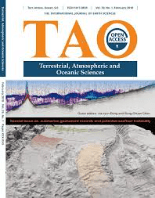
TERRESTRIAL ATMOSPHERIC AND OCEANIC SCIENCES
Unveiling Connections Between Land, Air, and SeaTERRESTRIAL ATMOSPHERIC AND OCEANIC SCIENCES, published by SpringerNature, is a distinguished peer-reviewed journal that has been an essential platform for innovative research in the fields of atmospheric science, oceanography, and Earth and planetary sciences since its inception. With an Open Access policy established in 1990, the journal ensures wide dissemination of knowledge, allowing researchers, professionals, and students to access cutting-edge findings without restrictions. Based in Switzerland and featuring a comprehensive coverage from 1996 to 2024, the journal currently holds a Q3 ranking across various categories, indicating its growing significance in the scientific community. Although it is positioned within the 39th percentile in Earth and Planetary Sciences, its commitment to fostering high-quality research makes it a valuable resource for advancing understanding of terrestrial environments and their interconnections. Researchers seeking a platform for their work in atmospheric and oceanic sciences will find TERRESTRIAL ATMOSPHERIC AND OCEANIC SCIENCES to be an ideal venue for sharing their insights with a global audience.
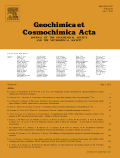
GEOCHIMICA ET COSMOCHIMICA ACTA
Advancing Geochemical Insights for a Sustainable FutureGEOCHIMICA ET COSMOCHIMICA ACTA is a premier journal dedicated to advancing the fields of geochemistry and petrology, published by Pergamon-Elsevier Science Ltd. With its ISSN 0016-7037 and E-ISSN 1872-9533, this esteemed journal has been at the forefront of scientific inquiry since its inception in 1950, with a strong commitment to disseminating high-quality research through 2024. Its reputation is underscored by an impressive impact factor and a ranking of #8 out of 154 in Earth and Planetary Sciences according to Scopus, placing it in the 95th percentile of its category. GEOCHIMICA ET COSMOCHIMICA ACTA serves as a critical resource for researchers, professionals, and students alike, offering insights into the complex interactions of geological and cosmological processes. While the journal is not open access, it remains a vital conduit for innovative research, fostering the scientific community’s understanding of earth materials and their significance.

AGU Advances
Transforming Ideas into Impactful ResearchAGU Advances, published by the American Geophysical Union, is a premier Open Access journal established in 2020, dedicated to advancing the field of Earth and Planetary Sciences. With an impressive Q1 ranking in the 2023 category of Earth and Planetary Sciences (miscellaneous) and a Scopus rank of #81/195, it serves as a vital platform for researchers, professionals, and students to share their findings and innovations. The journal fosters a collaborative environment, encouraging interdisciplinary approaches and high-quality research that addresses the fundamental questions of our planet and beyond. With its commitment to accessibility, AGU Advances ensures that cutting-edge research is available to a global audience, supporting the dissemination of knowledge that is crucial for addressing current and future scientific challenges. For those keen on contributing to or accessing groundbreaking studies in this dynamic field, AGU Advances is an invaluable resource.

Earth and Space Science
Unveiling the Secrets of Our Planet and Beyond.Earth and Space Science, published by the American Geophysical Union, is a distinguished open-access journal that has profoundly impacted the realms of earth and planetary sciences as well as environmental science since its inception in 2014. With impressive rankings, including Q1 in both Earth and Planetary Sciences and Environmental Science for 2023, this journal ranks 38th out of 195 in the general Earth and planetary sciences category and 51st out of 219 in environmental science, showcasing its commitment to high-quality research dissemination. The journal serves as a vital platform for researchers, professionals, and students, fostering the exploration of critical topics and advancements within these pivotal fields. With an accessible format, researchers can benefit from the rich content available, furthering their knowledge and ensuring that groundbreaking discoveries reach a broader audience. The journal's ongoing commitment to open access aligns with contemporary trends in scholarly communication, emphasizing inclusion and collaboration in tackling pressing global challenges.
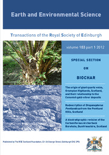
Earth and Environmental Science Transactions of the Royal Society of Edinburgh
Fostering interdisciplinary dialogue in Earth sciences.Earth and Environmental Science Transactions of the Royal Society of Edinburgh is a prestigious journal published by Cambridge University Press, dedicated to advancing research in the field of Earth and planetary sciences, as well as environmental science. With its ISSN 1755-6910 and E-ISSN 1755-6929, the journal has established itself as a crucial platform for disseminating innovative research and comprehensive reviews since its inception in 2007. Positioned in the Q3 quartile for both Earth and Planetary Sciences and Environmental Science, it contributes significantly to the ongoing dialogue and development in these areas, boasting a Scopus ranking that reflects its commitment to scholarly excellence with an emphasis on interdisciplinary approaches and real-world applications. The journal is based in the United Kingdom, with its editorial office located at the Edinburgh Building, Shaftesbury Road, Cambridge. As an essential resource for researchers, professionals, and students alike, Earth and Environmental Science Transactions offers opportunities for open discourse on pressing environmental challenges, fortifying its role in fostering a deeper understanding of our planet's systems and their interconnectedness.
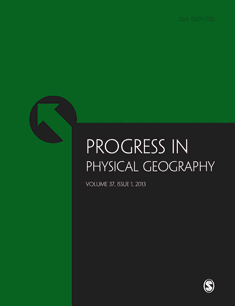
Progress in Physical Geography-Earth and Environment
Elevating discourse in Geography and Environmental Studies.Progress in Physical Geography-Earth and Environment is a premier academic journal published by SAGE Publications Ltd, renowned for its contributions to the fields of Earth and Planetary Sciences and Geography. With a distinguished history spanning from 1977 to 2024, this journal maintains a robust Q1 classification in both Earth and Planetary Sciences and Geography, Planning and Development, reflecting its high impact and rigorous scholarly standards. As evidenced by its Scopus rankings, it stands at the forefront of research, positioned in the 89th percentile among leading journals. Progress in Physical Geography aims to facilitate the exchange of innovative research, insights, and methodologies, making it an essential resource for researchers, professionals, and students dedicated to understanding and shaping the natural environment. While currently not designated as an Open Access journal, the wide accessibility of its content, combined with its significant impact factor, underscores its importance within the academic community seeking to advance knowledge and application in geography and environmental sciences.

All Earth
Navigating the Complexities of Earth and SocietyAll Earth is an esteemed open-access journal published by Taylor & Francis Ltd, dedicated to multidisciplinary research in the fields of Earth and Planetary Sciences, Global and Planetary Change, as well as Management, Monitoring, Policy, and Law. Since its inception in 2021, All Earth has swiftly positioned itself in the academic community, achieving notable rankings such as Q2 in Earth and Planetary Sciences and Q3 in related fields, showcasing its commitment to high-quality interdisciplinary scholarship. Researchers and professionals can benefit from its accessible content, which contributes to the ongoing discourse on critical environmental issues and innovative solutions for sustainable development. The journal is based in the United Kingdom and continues to be a vital source of information and inspiration for students and scholars aiming to tackle the pressing challenges of our planet through rigorous scientific inquiry and policy analysis.
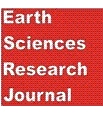
Earth Sciences Research Journal
Pioneering Research for a Changing WorldThe Earth Sciences Research Journal, published by the UNIV NACIONAL DE COLOMBIA, serves as a pivotal platform for the dissemination of knowledge in the diverse field of Earth and Planetary Sciences since its inception. With an ISSN of 1794-6190 and an E-ISSN of 2339-3459, this Open Access journal has been committed to providing unrestricted access to high-quality research since 2004. Located in Bogotá, Colombia, it has gained recognition within the academic community, achieving a Q3 quartile ranking in Earth and Planetary Sciences and notable Scopus rankings, which further underscores its relevance and reach. Its scope encompasses varied research topics, making it an essential resource for researchers, professionals, and students alike, seeking to contribute to or stay informed on the latest developments in the Earth sciences up to the year 2024. The journal not only anticipates cutting-edge research but also emphasizes collaborative dialogues among global experts, driving forward the conversation on critical issues facing our planet.
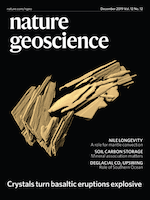
Nature Geoscience
Connecting Research to Global Challenges.Nature Geoscience, a premier journal published by NATURE PORTFOLIO, provides a platform for the dissemination of high-quality research in Earth and Planetary Sciences. With an impressive impact factor reflecting its significance — ranking in the 99th percentile and positioned at #1 out of 195 in Scopus Ranks within its category, this journal is a leading authority in its field. Since its inception in 2008, it has fostered interdisciplinary collaboration, addressing critical challenges such as climate change, natural disasters, and resource management. Although it does not offer Open Access, the journal is accessible through various research libraries, ensuring that vital findings reach a broad audience. The journal's esteemed reputation in the Q1 quartile of Earth and Planetary Sciences makes it an essential resource for researchers, professionals, and students aiming to advance their understanding of geoscientific phenomena.
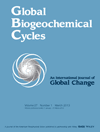
GLOBAL BIOGEOCHEMICAL CYCLES
Exploring the nexus of biogeochemistry and global change.GLOBAL BIOGEOCHEMICAL CYCLES, published by the American Geophysical Union, is a leading journal in the field of geochemistry that has gained significant recognition since its inception in 1987. With an impressive impact factor and a Q1 ranking in multiple categories such as Atmospheric Science, Environmental Chemistry, and Global and Planetary Change, it serves as a crucial platform for the dissemination of high-quality research. This journal emphasizes interdisciplinary studies focusing on biogeochemical processes and their implications for global environmental change, attracting contributions from a diverse range of scientific communities. Researchers, professionals, and students engaged in atmospheric sciences, environmental chemistry, and planetary sciences will find invaluable insights and state-of-the-art methodologies within its pages. GLOBAL BIOGEOCHEMICAL CYCLES continues to advance our understanding of the Earth’s systems, thus holding a pivotal position in shaping future environmental policies and sustainability efforts.